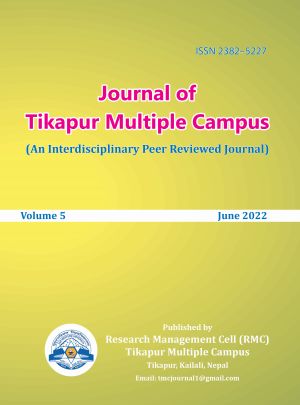Feminist Narrativization of Patriarchy in Swosthani Vrata Katha
DOI:
https://doi.org/10.3126/jotmc.v5i1.46517Keywords:
Patriarchy, Swosthani vrata, major and minor characters, feminist perspectiveAbstract
The paper explores Thulo Shree Swosthani Vrata Katha profoundly examining its fasting process and the stories of the protagonists through feminist perception on patriarchy. Goddess Parvati, Shiva, Goma Brahmini, Vrinda and Chandrawati in the book represent all married and unmarried Hindu women living with a rooted brainwashed psychology of patriarchy. The women taking vrata envision the same ancient mindset of getting a husband and fortune. The old patriarchal ideology of not allowing daughter(s) get prasad of Swosthani has not completely changed yet. Patriarchy refers to the institutionalized system of a society wherein the father rules and controls the mother and other female family members. Moreover, it confines women within the routinized law and order of men. Thus, the paper aims to explore the status of patriarchy in Swasthani Vrata Katha from a feminist perspective. The theoretical modality for the study is a descriptive-based qualitative research design primarily applying Sylvia Walby’s notion of Theorizing Patriarchy (2016). The paper collects data from secondary sources though few are collected via personal communications with Swami Ishwor Chaitanya Ji Maharaj and a social worker Madhuri Joshi. The significance of the study lies in the investigation of the patriarchal instinct of Swosthani vrata. Thus, the finding of the study affirms that the radical feminists critique Varta Katha as being full of personal and patriarchal.
Downloads
Downloads
Published
How to Cite
Issue
Section
License
Copyright (c) 2022 Nabaraj Pandey

This work is licensed under a Creative Commons Attribution-NonCommercial 4.0 International License.
This license enables reusers to distribute, remix, adapt, and build upon the material in any medium or format, so long as attribution is given to the creator. The license allows for commercial use.




